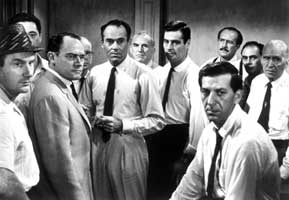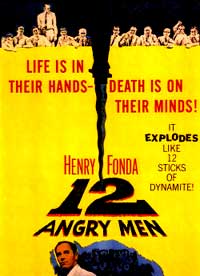The classic Twelve Angry Men (1957) is an actors' tour de force, a tale almost exclusively in dialogue that is no less suspenseful than any action oriented thriller, & a lot more intelligent. As these twelve jurors gather around the table to decide the guilt or innocence of a Latino youth accused of murdering his father, the first vote is eleven guilty, one not.
 Henry Fonda, that first lone holdout who doesn't believe the kid killed his father, is pitted against men who would rather get this done with & go home. Henry Fonda, that first lone holdout who doesn't believe the kid killed his father, is pitted against men who would rather get this done with & go home.
One by one each angry man turns himself & the case inside out, revealing step by step their own inner workings, terrors, disappointments & motivations, as they almost as a side-effect talk themselves out of believing in the kid's guilt.
Many incredible moments are encountered throughout the film, & some elements are almost invisible though very powerful. The angry men have no names for instance; there is no confusing their characters, yet we only learn two of their names after they are no longer on the jury. To learn this much about twelve individuals who remain identified by numbers, not names, is an eerie contradiction.
There's also a heated moment when a juror (Ed Bagley) after a crude speech is told (by E. G. Marshall) to shut up & sit down & not to say another thing. For the rest of the film, he never speaks. If you watch this film five times in five weeks, you'll find more & more suprises imbedded in the overall story & its internal vignettes.
At first it may seem that the "twelve personalities" are a mere catalog of types, the quiet man (John Fielder), the nervous man (Martin Balsam), the insecure man (Ed Binns), the disinterested man (Jack Warden), the bigot (Ed Begley), & so on. But in each case the given trait is a mere touchstone to something deeper & bigger for each man.
There are not many films that function primarily on the strength of the acting, & 12 Angry Men is a treasure in this regard. It's most curious that it remains cinematic even with its one claustrophic set, when it could easily have seemed like "merely" a play filmed live. This is because it has been framed, lensed, brilliantly cut, & provided momentum with every unobtrusive camera trick, so is not visually static, no more than are the characters emotionally static.
The ratio is in the course of the tale is reversed, & finally only one angry man (Lee J. Cobb) remains convinced of the boy's guilt. And saving the best for last, his psychology unfolds from his own private misery, & only when he begins to understand himself can he assess the case before them without prejudice.
copyright © by Paghat the Ratgirl
|

 Henry Fonda, that first lone holdout who doesn't believe the kid killed his father, is pitted against men who would rather get this done with & go home.
Henry Fonda, that first lone holdout who doesn't believe the kid killed his father, is pitted against men who would rather get this done with & go home.